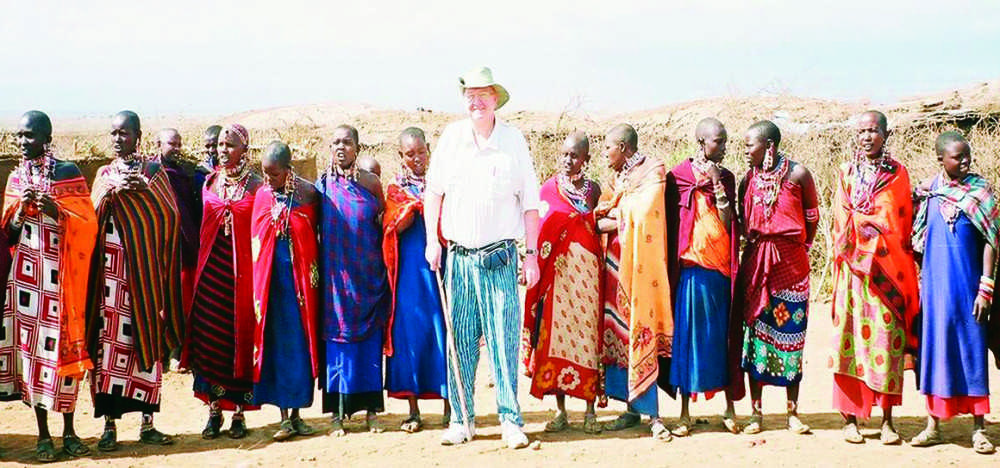A lifetime of experience: Substitute teacher hopes to bring inspiration to students
He has been a substitute teacher for 14 years, but he is not what his students consider the “typical” sub. He is Milt Enright.
“The typical substitute comes in and hands out stuff,” Enright said. “I talk to the students. If it’s a slow class, I will call someone up and say, ‘how you doing?’ I make sure that the lesson gets done and then I learn from them. It’s a two way street.”
Enright was born and raised in New York City in 1936 in a tenement house on Haviland Avenue.
“My time in New York was probably the most educational in my lifetime,” Enright said. “I saw everything good and bad. I saw the business community and I saw all different types of cultures. I saw the Irish people who became the cops and firemen and the Jewish people who were tailors.”
Enright attended the City College of New York, which was a free college at that time due to the high taxes. During a summer job at a swimming club Enright had as a teenager, Enright met Don Powers, a college football player. Powers assisted Enright on deciding which career path to take.
“In life, everything is contacts,” Enright said. “I had a role model. I respected him, listened to him and then got into business school and human resources. I’m not an engineer and I’m not a financial guy, and I felt human resources was what I was best at.”
After college, Enright joined the U.S. Navy in Naval Station Great Lakes, Chicago for two years. After the Navy, Enright worked in human resources for 17 years at Kimberly Clark Credit Union in Neenah, Wisconsin. He worked with unions and handled grievances, arbitration cases, contract negotiations and recruiting and then later on became the human resource manager at the Miller Brewing Company in Fort Worth, Texas.
“I was put in situations where there was trouble with management unions,” Enright said. “That was the culture – management good and unions bad and management had all the power. I was supposed to go in there and change the culture and attitude. Not too many management people welcomed me in because my philosophy was different – I talk to people. There are things you should be doing now to condition yourself so I talk to my students about networking and communication skills – what people look for.”
When the management was convinced they had to fire someone, Enright said he would confront the manager to help the manager see what he was losing in the process.
“I would say, ‘First of all, we don’t have a case,’” Enright said. “’We also have some potential Equal Employment Opportunity Commission problems and I think if we fire this individual, we’re going to cause a major problem in the rallies.’ The key thing about my job was to tell management or other people what they didn’t want to hear and I always felt I was good at that because it’s not just telling them, it’s how you tell them and that you have to listen.”
Enright worked at Federal Home Loan Bank in Dallas for 7 to 8 years. Then, he spent a year working as a licensed nursing home administrator in Ennis after going back to school at Southwestern University in Dallas. Later, while he was out of a job for awhile, searching for a career change, he considered going into teaching. Enright started out as a substitute teacher in Lancaster and Duncanville and then moved to Plano for a change in location. According to Enright, his transition from business to education was natural because he was able to take a lot of what he had learned in business and transfer it into the education process.
“The key concept I wanted to get across was that many of the classes you take tie into the business environment – math classes for example,” Enright said. “I try and tell the students that this is an advantage to them. If you’re good at it, this is what can happen later. You can almost take any subject and apply it to things that can help you later on. It’s a tough world out there and you have to be ready for it.”
Enright said he tries to prepare his students for the real world, especially those without a business corporate background.
“What I tell them is if you’re ever interviewing for a job when you get out of high school or college, one of the first questions they’re going to ask you is ‘tell me about your skill sets,’” Enright said. “And I tell them, you don’t have to answer it now, but you’re going to have to be prepared to tell people essentially why they should hire you.”
If he has not substituted for the class before, Enright spends the first three to five minutes telling the students a little bit about himself, from his background to his experiences.
“This way they know what they’re dealing with,” Enright said. “I want to get the point across that I’m not just some guy coming in. I can give them helpful information. I don’t tell them stories, but I try to teach them life lessons.
Then I go to the lesson plan and make sure it’s done. My main objective is to make sure that we achieve the objectives of the day.”
Enright believes his greatest learning lessons for students are from his safari trip to Africa five or six years ago with eight other people.
“I’ve always wanted to go to Africa,” Enright said. “I saved up money and decided to go first class.”
Enright said they visited Nairobi, Kenya as well as other cities in Kenya to see the animals, the culture and Africa’s other specialties like the Amboseli National Park. When the group was scheduled to go to a village in a lodge in Nairobi, the rest of the group refused to go because they would be pressured to buy something.
“That was all the more reason why I wanted to go,” Enright said. “So I went. I was the only one who went.”
Enright spent time looking around the village and then visited the village chief. Afterwards, the store workers sat him down and the elderly came to put pressure on him to buy items.
“Eventually, I picked out some stuff,” Enright said. “Because I saw poverty, at the end of it, I took my wallet out and gave all the money I had in my wallet. I said, ‘take it.’ I got some stuff too, but that was a very positive experience for me. You can always see the animals, but where everyone didn’t want to go, I went. That’s why I’m different.”
When Enright visited a school in the village, he walked into the classroom and saw around 30 children sitting at tables. All of a sudden, the teacher came in and all of the students stood up.
“That was an immediate indication to me that in the culture I was in, you respect the elders,” Enright said. “There at the end of it, coming from New York, I thought maybe they’re setting me up or something. So I went up to the teacher and asked her, ‘What do you do when you have a student who is disrespecting you?’ She looks at me and smiles, ‘We have none.’”
Enright said the reason is mothers and fathers tell their children that their only way out of poverty is an education.
“The kids understand that they have to do this,” Enright said. “When you meet with the kids, you can make their day by giving them a pencil. Forget big toys, it’s about the basic things in order to survive.”
While at the lodge, Enright spoke to the manager about Kenya’s education system. Soon after, others began to gather around.
“They took pride in the fact that they were from Kenya and someone was there asking about the education system,” Enright said. “They have 40% unemployment. That’s another thing I learned – not every place is like Plano, Texas.”
Through working in human resources, visiting a classroom and village in Africa and briefly seeing how it was as a nursing home administrator, Enright said he found his place in education.
“I have found that my experience as a substitute teacher has been the most gratifying to me, no doubt about it, because I have made an impact,” Enright said. “I can teach as much as I want but I only go to certain schools where the students want to listen and give me a reaction. Students recognize that I have a message to tell. They remember me and they remember what I say.”
Your donation will support the student journalists of Plano Senior High School. Your contribution will allow us to purchase equipment and cover our annual website hosting costs.
Senior Priyanka Hardikar is looking forward to her second year in newspaper, this year as an editor. As online editor, she hopes to take the online publication...







